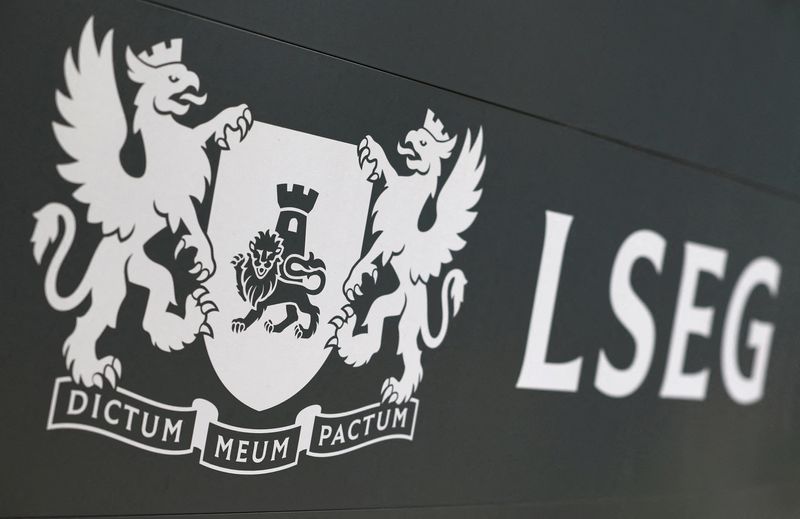By Huw Jones
LONDON (Reuters) - Britain's stock markets should halve the time it takes to settle a share trade to stay competitive and complete this shift by the end of 2027, a report recommended on Thursday, a step the UK government has backed to play catch up with Wall Street.
Exchanges in the United States, Canada and Mexico move to settlement within one business day - dubbed T+1 - at the end of May to cut risk, catching up with India and China, meaning 55% of global equity markets will operate on T+1 or less by the end of this year.
This is piling pressure on Britain and continental Europe to follow suit. The European Union has already said it would do so, though with no date set. Switzerland will have little choice but to switch as well.
Britain's finance ministry commissioned the report into cutting settlement times for trades on the London Stock Exchange and other platforms. This would reduce the time it takes to settle trades for cash to one business day from two currently.
The Accelerated Settlement Taskforce, which produced the report, found there was industry consensus to move to T+1 given that increasing efficiency is essential to maintain international competitiveness.
Taskforce Chair Charlie Geffen said government and regulators needed to push for a coordinated move to T+1 given that it will mean "significant investment", but also bring cost savings and reduce risk.
"It just makes sense to have a timetable and a deadline. If you don't have timelines, stuff doesn't get done," Geffen told Reuters.
"Learning the lessons from the United States is going to be important. I suspect there will be some teething issues to resolve."
European asset managers have already complained about not having enough time to find dollars to pay for U.S. stocks under the new settlement regime which comes into effect in the United States at the end of May.
Switching is costly. In the report, consultants Accenture (NYSE:ACN) estimated that in relation to the T+1 switch in the U.S., total investment of $30-50 million a year for three years would be needed by each large financial firm to make the switch.
Geffen recommended setting up a technical group to report by year-end on operational changes that will cost millions of pounds, such as back office automation at banks and asset managers. The industry should complete this by the end of 2025 to get systems ready.
The technical group would decide on a deadline for a mandated switch to T+1 which would be the end of 2027 at the latest.
"I am delighted to confirm that we are accepting all of the recommendations that the report makes to the government," Britain's financial services minister Bim Afolami said in a joint statement with the Taskforce.
Stocks make up 42% the 8.8 trillion pounds ($11.10 trillion) of assets managed out of London, with 32% of this in North American stocks and 19% in European stocks.
ALIGNMENT OR GO IT ALONE?
The stock settlement switch adds to a whole string of regulatory changes the UK finance industry has faced post-Brexit.
Geffen said it had been difficult to achieve consensus on the pace at which Britain should move to T+1, with some wanting EU alignment, while others want the mismatch with Wall Street to be as short as possible.
Britain, the EU and other European jurisdictions should try to work together to try to align the shifts to T+1, the report said.
EU regulators have noted that the bloc has multiple stock exchanges, and clearing and settlement houses, making a switch to T+1 more complicated than for a single jurisdiction.
"If the EU or other European jurisdictions commit to a transition date to T+1 the UK should consider whether it wishes to align with that timeline," the report said.
"However if that cannot be achieved within a suitable timescale the UK should proceed in any event."
Jos Dijsselhof, CEO of SIX Group, which operates the Zurich stock exchange and the Madrid bourse in the EU, said he would like to see Britain, the EU and Switzerland adopt T+1 at the same time. "We don’t see much benefits from everybody going individually," he told Reuters.
Whether firms that want to move early to T+1 would be allowed to do so after 2025 is an issue the technical group would work through, Geffen said.

The report also said the technical group should consider a move at a later date to instant settlement or T+0, which was "technically possible today".
($1 = 0.7925 pounds)
